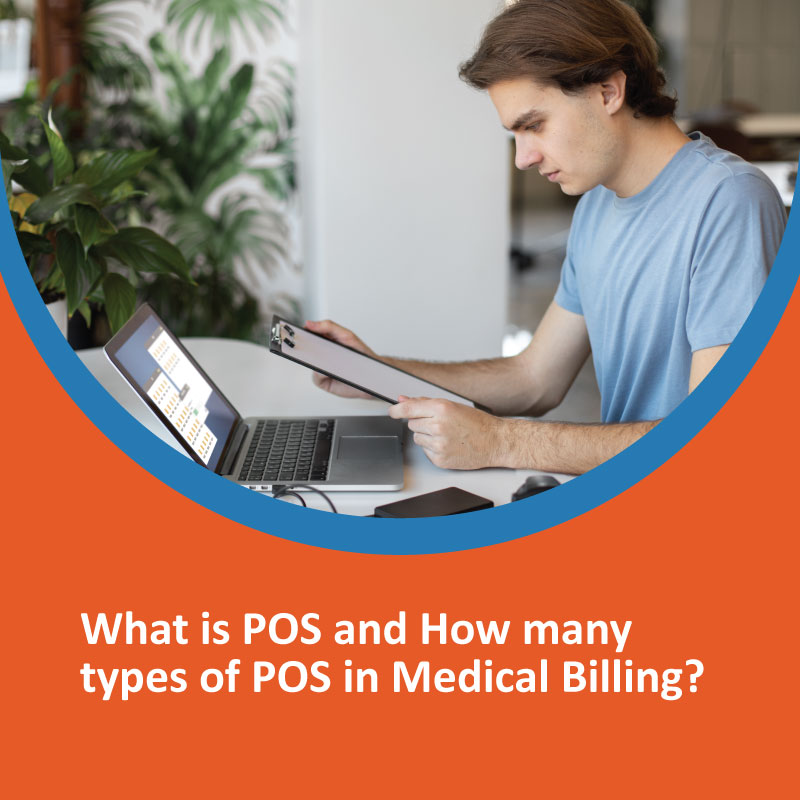The term “POS” is often used by professionals in the medical and healthcare sectors. POS is an acronym for place of service in medical billing. Medical billing POS systems are crucial for both insurance claim processing and medical providers. The basics of medical billing (POS) are explained in length in this article, which also discusses POS programs, POS codes, and variations in POS implementation across Medicare standards.
You may read: POS 65 Medical Billing: What It Means and Why It Matters
What is POS in medical billing?
POS in medical billing stands for Place of Service. Two-digit POS codes that identify the healthcare facility providing services are necessary for medical services billing through health claims. To receive accurate billing reimbursements from Medicare, Medicaid, and other insurance companies, each medical claim needs the proper POS codes. Medical billing claim denials and lower compensation, as well as potential audits, arise when healthcare providers select the incorrect POS code.
What is the meaning of POS in medical billing?
The POS code identifies service delivery locations for payer agencies such as Medicare, Medicaid, and commercial insurance companies. For instance:
· POS 11:The Office designation is the appropriate place of sale when medical services are performed in a doctor’s office.
· POS 21:Medical treatment for hospitalized patients should be given via the Inpatient Hospital POS.
· POS 22: Outpatient Hospital refers to payments for patient care provided in hospitals without requiring hospital admission.
What is the importance of POS in medical billing?
Healthcare facilities and medical personnel are served by the Medical Point of Sale (POS) system, which offers efficient management solutions. The system has features that meet the special needs of healthcare facilities. A medical POS system often comprises these important aspects throughout operation:
Patient Management:
The system allows healthcare organizations to create and manage comprehensive profiles of their patients. A medical POS system maintains three types of information: personal information and medical records, as well as insurance information and essential contact addresses. The centralization of patient data into a single database allows healthcare providers to get information quickly.
Appointment Scheduling:
Healthcare professionals rely greatly on efficient scheduling for their medical practice operations. A medical POS system allows staff workers to easily create, reschedule, and manage appointments.
Billing and Invoicing:
Medical point of sale systems streamline billing operations by generating itemized invoices based on precise estimations of delivered treatments and procedures, as well as recorded medical services. These systems include integration capabilities for determining patient financial responsibilities, as well as computerized insurance claim processing.
Integrated Payment Processing:
Medical centers use these systems to provide secure payment processing that accepts a variety of payment methods, such as debit and credit cards, mobile wallets, and electronic cash transfers.
Electronic Health Records (EHR) Integration:
The technology facilitates interoperability between the EHR platform, allowing for rapid access to patient data across both systems, reducing duplicate labor while keeping correct data.
Prescription Management:
Medical POS systems assist healthcare providers in creating electronic medical prescriptions, which are automatically transmitted to patient-selected pharmacies, as well as keeping prescription audit trails for each individual patient.
Health Insurance Portability and Accountability Act (HIPAA) Compliance:
A medical POS system must adhere to the severe privacy and data security rules outlined in the Health Insurance Portability and Accountability Act (HIPAA). Use of this technology ensures the confidentiality of patients’ personal information.
What are the types of POS in medical billing?
Using Types of POS in medical billing aids in determining where medical services were provided. Correct POS coding will ensure that insurance carriers bill and reimburse you appropriately. The most popular POS codes are described in detail below:
POS 11 in medical billing:
POS 11 services provided by healthcare providers in their private offices, medical centers, or clinics are efficient. The practice is primarily intended for routine check-ups, professional consultations, and non-urgent situations.
POS 12 in Medical Billing:
Health care services are delivered from the convenience of one’s own home. Nurses, physical therapists, and palliative care providers are some examples of home visitors. When patients are unable to attend the hospital, they frequently rely on the POS.
POS 02 in Medical Billing:
Patients who are away from home, like at school, work, or a community center, can benefit from synchronous telemedicine. This code is intended for secure telemedicine sessions with real-time technologies.
POS 10 in Medical Billing:
When patients are at home, telemedicine providers employ this method. First and foremost, POS 10 was created to distinguish remote care at home from care in other locations. Patients can obtain general care, mental health counselling, and chronic disease management services from the comfort of their own homes.
POS 21 in Medical Billing:
Provides information about the medical care and services provided to patients who have been admitted to a hospital for more than one night. Patients may receive surgery, therapy for severe illnesses, or assistance with labor and delivery under this sort of care. To use POS 21 billing, admission orders, length of stay in the hospital, and all pertinent services provided are logged.
POS 23 in Medical Billing:
POS 23 refers to services provided in a hospital’s emergency room for instant or unexpected medical concerns. It includes incidents of trauma, chest pain, injuries, and acute symptoms. Because of the requirement for prompt and critical care, POS 23 often gives higher reimbursement to hospitals.
POS 15 in Medical Billing:
POS 15 – A mobile facility capable of providing preventative, screening, diagnostic, and therapeutic services. Services in rural or remote areas, as well as support for outreach activities and public health initiatives are provided by POS 15.
POS 20 in Medical Billing:
POS 20 is used when patients seek medical attention in an urgent care clinic for urgent but non-critical illnesses. Infections, sprains, and small cuts are among the possible injuries. If a patient need care when doctors are unavailable and it is not an emergency, POS 20 typically applies.
POS 24 in Medical Billing:
It includes locations other than hospitals where patients can get outpatient surgery. POSE 24 covers cataract and hernia surgeries performed on the same day. You are typically paid less for services rendered at a physician’s office than in a hospital outpatient department.
POS 22 in Medical Billing:
POS 22 refers to services provided in a hospital’s outpatient department. These services are delivered within the hospital and do not require an overnight stay. POS 22 is often used for outpatient procedures, diagnostic tests, and hospital treatments.
POS 19 in Medical Billing:
POS 19 refers to a section of an off-campus hospital provider-based department that offers diagnostic, therapeutic (both non-surgical and surgical), and rehabilitation services to individuals who are ill or injured but do not need to be institutionalized or admitted to the hospital.
Quick Reference Table of POS Codes in Medical Billing:
| POS Code | Location | Setting |
| POS 11 in Medical Billing | Office | Physician’s private clinic |
| POS 12 in Medical Billing | Home | Patient’s residence |
| POS 02 in Medical Billing | Telehealth (non-home) | Virtual visit from school/work |
| POS 10 in Medical Billing | Telehealth (home) | Virtual consult at the patient’s home |
| POS 21 in Medical Billing | Inpatient Hospital | Admitted overnight or longer |
| POS 22 in Medical Billing | On-Campus Outpatient Hospital | Same-day diagnostics at the hospital |
| POS 23 in Medical Billing | Emergency Room – Hospital | ER visits for urgent treatment |
| POS 15 in Medical Billing | Mobile Unit | Mobile health vans |
| POS 20 in Medical Billing | Urgent Care Facility | Non-life-threatening after-hours care |
| POS 24 in Medical Billing | Ambulatory Surgical Center (ASC) | Same-day surgical procedures |
| POS 19 in Medical Billing | Off-Campus Outpatient Hospital | Hospital-affiliated off-site clinic |
Conclusion:
Technological advancements in the healthcare sector include the use of place-of-service (POS) systems created especially for healthcare establishments. While the use of accurate medical histories, better inventory control, and enhanced data protection emerge as system benefits, medical efficiency is increased through the integration of patient records with invoicing. When healthcare professionals use medical point-of-sale systems, they create a patient-centered approach that leads to better healthcare outcomes.



